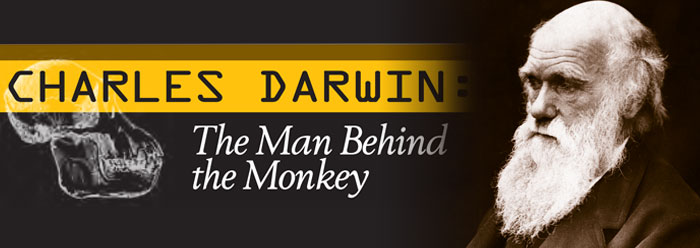Who: Charles Robert Darwin
When: February 12, 1809 - April 19, 1882
Where: Shrewsbury, England
What: Father of the Theory of Evolution by Natural Selection
Charles Darwin's theory of evolution by natural selection is hailed in the mainstream scientific community as the unifying theory of the life sciences. He has been elevated to demigod status and given a place of esteem in the public arena, where any ideas outside his outdated theory are systematically and unfairly expelled.
But Darwin wasn't a god. He wasn't even a demigod. He was a man whose speculations of long ages of death and mutation offered an anti-Creator explanation for the diversity of life observed on earth. Two centuries after his birth, it is time for Darwin to come off his throne long enough for us to examine the man behind the monkey.
Early Life
Charles Darwin was born in 1809. He attended boarding school at Shrewsbury School, and in October 1825 went to Edinburgh University to study medicine. While there, he worked under Robert Grant studying marine invertebrates. He did not handle the sight of blood and suffering well, so he abandoned medicine and aimed at ministry instead. Church of England ordination required a bachelor's degree from an English university, so he entered Christ's College at Cambridge in 1828.
Darwin wasn't a wonderful student, but he was passionate about natural science. He collected beetles and became close friends with botany professor John Stevens Henslow, who introduced him to other leading naturalists. He enjoyed William Paley's Evidences of Christianity and Natural Theology, which argued for divine design in nature. Soon after earning his bachelor of arts degree in 1831, he studied field geology in north Wales with Adam Sedgwick.
The HMS Beagle
Henslow proposed that Darwin take his place on the HMS Beagle journey to the Americas as an unpaid naturalist and gentleman companion to Captain Robert FitzRoy. Darwin was almost a complete novice, his experience based only on rudimentary geological studies, beetle-collecting, and the dissection of marine invertebrates.
During the five-year journey, Darwin kept detailed notes of his observations and conclusions. Along with letters, he sent specimens to Cambridge. FitzRoy had given him a copy of Charles Lyell's Principles of Geology, which promoted uniformitarian concepts and heavily influenced Darwin's thinking. In Cape Town, he met astronomer John Herschel, who favored Lyell's uniformitarianism as "a natural in contradistinction to a miraculous process."1
Darwin made some of his more famed observations in excursions to the coasts and islands of South America, such as the variations he noted in finches and mockingbirds found in the Galapagos. Before that, he observed in Tierra del Fuego how Fuegians, after living in England, acted differently than their "savage" relatives, comparing it to the differences between domesticated and wild animals.
Henslow faithfully distributed the notes he received during the voyage, and when the Beagle returned in 1836 Darwin was already a celebrity and accepted among the scientific elite. He sought expert opinions for some of his findings. Darwin toyed with the idea of the transmutation of species, or one species changing into another, and in July 1837 produced in his notebook his famed evolutionary tree, above which he scrawled, "I think." He edited the expert reports on his specimens and, with Henslow's help, produced the multi-volume Zoology of the Voyage of H.M.S. Beagle (1832-1836).
On the Origin of Species
Expanding on the idea of the transmutation of species, Darwin added the concept of nature selecting certain desirable traits and passing those on to future generations. He theorized that if enough desirable traits accumulated, a new species could be formed altogether. Coupled with the long geological age theories of Lyell, the descent with modification--not the popular "change over time" definition that evolutionists favor today--theory was born.
On the Origin of Species by Means of Natural Selection, or the Preservation of Favoured Races in the Struggle for Life went on sale November 22, 1859. Darwin knew his book would conflict with creation-based origin concepts.
In considering the Origin of Species, it is quite conceivable that a naturalist, reflecting on the mutual affinities of organic beings, on their embryological relations, their geographical distribution, geological succession, and other such facts, might come to the conclusion that each species had not been independently created, but had descended, like varieties, from other species.2
Though Darwin had not completely renounced his faith, he expelled creation science as a plausible explanation. He acknowledged the power of God, just not God's power to create.
He who believes that each equine species was independently created, will, I presume, assert that each species has been created with a tendency to vary, both under nature and under domestication….To admit this view is, as it seems to me, to reject a real for an unreal, or at least for an unknown, cause. It makes the works of God a mere mockery and deception; I would almost as soon believe with the old and ignorant cosmogonists, that fossil shells had never lived, but had been created in stone so as to mock the shells now living on the sea-shore.3
Origin of Species was popular, thanks to Darwin's friends in the elite scientific community. The Church of England's response was mixed, its leaders either accepting it as theistic evolution or rejecting it as heresy. Because of his health, Darwin didn't attend debates, but friends such as Joseph Hooker and "Darwin's bulldog" Thomas Henry Huxley advocated strongly for him.
Darwin went on to publish many books, including the controversial The Descent of Man, and Selection in Relation to Sex (1871) and The Expression of the Emotions in Man and Animals (1872). Origin of Species was translated into many languages, and Darwinism became a movement that spurred other evolutionary ideas, including Lyell's Geological Evidences of the Antiquity of Man (1863), Huxley's Evidence as to Man's Place in Nature (1863), and Henry Walter Bates' The Naturalist on the River Amazons (1863).
Darwin's work is also associated with ideas such as Herbert Spencer's "survival of the fittest," though Darwin himself did not coin the term. Having witnessed slavery aboard the Beagle, Darwin didn't like it, yet his ideas have been used to justify practices ranging from laissez-faire capitalism, racism, colonialism, Francis Galton's eugenics, and social Darwinism.
Loss of Faith and Death
Though Darwin was baptized in the Church of England, he came from a family of nonconforming Unitarians, and his father and grandfather (Zoönomia author Erasmus Darwin) were freethinkers. He considered the Bible an authority on morality, but after his Beagle voyage he questioned its history. He also questioned the benevolence of the Creator in the face of pain and suffering, rather than seeing it as the result of mankind's sin and the fallen world.
After his daughter Annie died in 1851, Darwin's faith in Christianity dwindled further and he stopped going to church.4 He suffered ill health throughout his adult life and died in Downe, Kent, on April 19, 1882. There is speculation that he reverted to Christianity on his deathbed, but these claims were refuted by his children. His colleagues requested that Royal Society president William Spottiswoode give him a state funeral and inter him in Westminster Abbey near John Herschel and Isaac Newton. Darwin was one of only five non-royals to be given a state funeral during the 19th century.
Darwin Today
Darwin Day has become an annual celebration. This year will mark Darwin's 200th birthday and the 150th anniversary of Origin of Species' publication. To commemorate this, Darwin exhibitions have opened in museums around the world, including one that will end April 19 at the Natural History Museum in London. The University of Cambridge will feature a festival, as will his birthplace in Shrewsbury.
A special two-pound coin has been minted in Darwin's honor in the U.K. And in 2008, the Church of England issued a formal apology to Darwin "for misunderstanding you and, by getting our first reaction wrong, encouraging others to misunderstand you still."5
But today, Darwin's theory of descent with modification--which spurred many other detrimental ideas--remains riddled with holes large and plenty enough to foster major doubts in his claims. Transitional life forms, which if not found would be the undoing of Darwin's theory,6 are still missing. His theories on pangenesis (the blending of hereditary traits) and abiogenesis (life begat by non-life) were refuted by Gregor Mendel7 and Louis Pasteur8 respectively. And research continues to show complexity in design, rather than random modification.
Despite the mounting scientific evidence against it, many scientists today still blindly adhere to Darwinism. "Biologists must constantly keep in mind that what they see was not designed, but rather evolved," wrote molecular biologist Francis Crick.9
So, in 2009 we celebrate a man whose ideas prompted many questions to be asked, but which have unfortunately resulted in many incorrect and even destructive answers. Even 150 years after his book hit the shelves, Darwinian evolution remains a theory in crisis.
References
- Darwin, C. 2006. The Origin of Species: A Variorum Text. Ed. M. Peckham. Philadelphia, PA: University of Pennsylvania Press, 69.
- Darwin, C. 1859. On the Origin of Species by Means of Natural Selection, or the Preservation of Favoured Races in the Struggle for Life. London: John Murray, 3.
- Ibid, 167.
- Van Wyhe, J. 2008. Darwin: The Story of the Man and His Theories of Evolution. London: Andre Deutsch Ltd.
- Wynne-Jones, J. Charles Darwin to receive apology from the Church of England for rejecting evolution. Telegraph. Posted on telegraph.co.uk September 14, 2008, accessed January 13, 2009.
- "Geology assuredly does not reveal any such finely graduated organic chain; and this, perhaps, is the most obvious and gravest objection which can be urged against my theory. The explanation lies, as I believe, in the extreme imperfection of the geological record." Darwin, Origin, 280.
- Dao, C. 2008. Man of Science, Man of God: Gregor Johann Mendel. Acts & Facts. 37 (10): 8.
- Dao, C. 2008. Man of Science, Man of God: Louis Pasteur. Acts & Facts. 37 (11): 8.
- Crick, F. 1988. What Mad Pursuit: A Personal View of Scientific Discovery. London: Sloan Foundation Science, 138.
* Ms. Dao is Assistant Editor.
Cite this article: Dao, C. 2009. Charles Darwin: The Man Behind the Monkey. Acts & Facts. 38 (2): 12.














